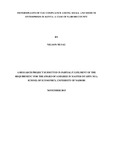| dc.description.abstract | Tax is an important stream of revenue for government’s development projects and therefore
all efforts must be made by governments to ensure that it is accurately and efficiently
collected so as to facilitate the government’s operations. In an effort to maximize collection
of revenue and efficiency in tax administration, key changes to tax policy evolving around
ensuring equity, further widening the tax base, promoting increased investment and in so
doing, reducing the tax compliance burden, have in the recent past been made by the Kenyan
government. The main objective of this study was to determine the factors influencing tax
compliance among SMEs in Nairobi County.
The researcher outlined a detailed literature review and identified the independent variables
for this research to be detection and penalties; tax information and complex filing procedures;
value of tax and trust in government while the dependent variable was tax compliance. The
research used a quantitative research design. Given the large population of registered SMEs
as taxpayers in Nairobi County, a sample size of 398 was picked as representative, to be the
focus of this study out of which 120 of them were returned and analyzed. To ensure that
various diverse categories of taxpayers and business entities were included in the survey,
stratified sampling technique was adopted. Data was collected using self-administered
questionnaires. The collected data was consequently analyzed using Statistical Package for
Social Scientist software and then transferred to STATA for further analysis.
Using binary probit regression model, the study findings revealed that an increase in the
perception of individuals about the difficulty of evading taxes is found to increase the
likelihood of being tax compliant among SMEs in Nairobi County. The findings also revealed
that individuals who are more satisfied with public service provision; have enough tax
information; trust government officials in handling their taxes; and have the perception that
tax filing procedures are less complex are more likely to be tax compliant. By gaining an
understanding of these underlying factors, the KRA and the government will be able to make
changes that will greatly improve taxpayers’ tax compliance level. Improved tax compliance
will result into increased government revenues thus reduced budget deficits. Accordingly, the
tax authority will provide quality services to taxpayers and the government as a whole will
finance its expenditure and improve on provision of public goods thus leading to the growth
of the Kenyan economy. | en_US |



